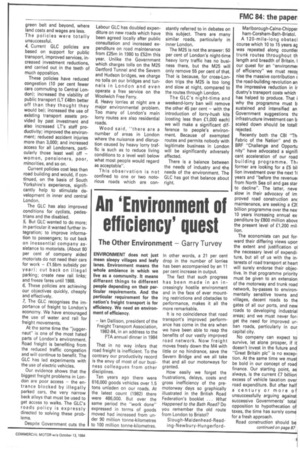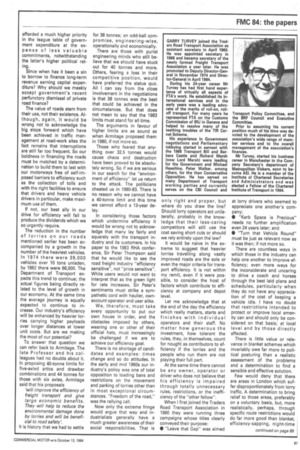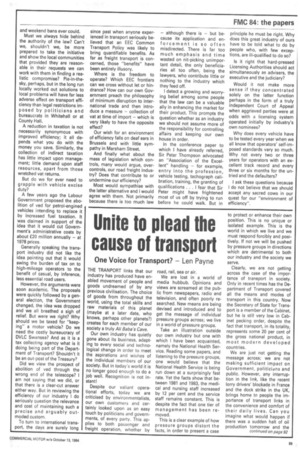An 'Environment of efficiency' quest
Page 87

Page 89

Page 91

If you've noticed an error in this article please click here to report it so we can fix it.
The Other Environment — Garry Turvey
ENVIRONMENT does not just mean sleepy villages and leafy lanes. Environment means the whole ambience in which we live as a community. It means different things to different people depending on their particular requirements. And the particular requirement for the nation's freight transport is for efficiency. We need an environment of efficiency.
— Ian Dallison, president of the Freight Transport Association, 1982-84, in an address to the FTA annual dinner in 1984 That in no way infers that road freight is inefficient. To the contrary our productivity record is the envy of most of our business colleagues from other disciplines.
Ten years ago there were 616,000 goods vehicles over 1.5 tons unladen on our roads. At the latest count (1982) there were 486,000. But over the same period the "work done" expressed in terms of goods moved had increased from under 90 million tonne-kilometres to 100 million tonne-kilometres. In other words, a 21 per cent drop in the number of lorries has been accompanied by an 11 per cent increase in output.
The fact that such progress has been made in an increasingly hostile environment and in the face of ever mounting restrictions and obstacles to performance, makes it all the more remarkable.
It is no coincidence that road transport's improved performance has come in the era when we have been able to reap the benefits of our vastly improved road network. Now freight moves freely down the M4 with little or no hindrance, save the Severn Bridge and we all take that and all our motorways for granted.
How easily we forget the frustrations, delays, costs and gross inefficiency of the premotorway days so graphically illustrated in the British Road Federation's booklet ... What Happened to the Bath Road? Do you remember the old route from London to Bristol?
Slough-Maidenhead-Reading-Newbury-Hungerford
Marlborough-Calne-Chipper ham-Corsham-Bath-Bristol.
A 120-mile-long obstacl course which 10 to 15 years ag was repeated along countle; trunk routes throughout th length and breadth of Britain. I our quest for an ''environmer of efficiency" we must recoi nise the massive contribution the road-building revolution an the impressive reduction in ir dustry's transport costs which has helped to produce. That i why the programme must b sustained and intensified an Government suggestions the infrastructure investment can b scaled down should be total! rejected.
Recently both the CBI "Th Fabric of the Nation" and thi BRF "Challenge and Opportu nity" have advocated a signifi cant acceleration of our road building programme. Th; former are looking for a £5 bil lion investment over the next 11 years and "before the revenue; from North Sea oil and gas star to decline". The latter, neve slow in their advocacy of im proved road construction anc maintenance, are seeking a £2( billion programme over the nex 10 years increasing annual ex penditure by £800 million above the present level of £1,200 mil. lion.
The economists can put for ward their differing views upon the extent and justification at the necessary level of expenditure, but all of us with the interests of road transport at heart will surely endorse their objective. In that programme priority must be given to an extension of the motorway and trunk road network, by-passes to environmentally sensitive towns and villages, decent roads to the gates of all our ports, and new roads to developing industrial areas; and we must never forget the need for improved urban roads, particularly in our capital city.
No company can expect to survive, let alone prosper, if it doesn't invest in the future and "Great Britain plc" is no exception. At the same time we must be bold in our concept of road finance. Our starting point, as always, is the current £7 billion excess of vehicle taxation over road expenditure, But after half a century or more of unsuccessfully arguing against successive Governments' total opposition to hypothecation of taxes, the time has surely come for a fresh approach.
Road construction should be continued on page 87 afforded a much higher priority in the league table of government expenditure at the expense of less valuable commitments, notwithstanding the latter's higher political rating.
Since when has it been a sin to borrow to finance long-term revenue earning capital expenditure? Why should we meekly accept government's recent perfunctory dismissal of private road finance?
The value of roads stem from their use, not their existence. Although, again, it would be wrong not to acknowledge the big steps forward which have been achieved in traffic management at road-work sites the fact remains that interruptions are still far too frequent. So our boldness in financing the roads must be matched by a determination to build them to last with our motorways free of self-imposed barriers to efficiency such as the collection of tolls and with the right facilities to ensure that drivers and heavy vehicle drivers in particular, make maximum use of them.
If not, our best ally in our drive for efficiency will fail to produce the dividends which we so urgently require.
The reduction in the number of lorries on our roads mentioned earlier has been accompanied by a growth in the number of the heaviest vehicles. In 1974 there were 3 9,0 00 vehicles over 10 tons unladen, by 1982 there were 66,000. The Department of Transport expects this trend to continue; the actual figures being directly related to the level of growth in our economy. At the same time the average journey is equally expected to continue to increase. Our industry's efficiency will be enhanced by heavier lorries carrying higher payloads over longer distances at lower unit costs. But are we making the most of our potential?
To answer that question we can refer back to Armitage. The late Professor and his colleagues had no doubts about it. In proposing 40-tonne limits for five-axled artics and drawbar combinations and 44 tonnes for those with six axles, Armitage said that his proposals
'will improve the efficiency of freight transport and give large economic benefits. They will help to reduce the environmental damage done by lorries and will be beneficial to road safety'.
It is history that we had to settle
for 38 tonnes; an odd-ball compromise, engineering-wise, operationally and economically.
There are those with purist engineering minds who still believe that we should have stuck out for 40 tonnes and more. Others, fearing a loss in their competitive position, would have preferred the status quo. All I can say from the close involvement in the negotiations is that 38 tonnes was the best that could be achieved in the circumstances. But that does not mean to say that the 1983 limits must stand for all time.
The arguments in favour of higher limits are as sound as when Armitage proposed them in 1980, if not more so.
Those who feared that anything over 32.5 tonnes would cause chaos and destruction have been proved to be absolutely wrong. So if we are serious in our search for the "environment of efficiency" let us return to the attack. The politicians cheated us in 1980-83. There is no reason why we cannot have a 40-tonne limit and this time we cannot afford a 13-year delay.
In considering those factors which undermine efficiency it would be wrong not to acknowledge that many lay fairly and squarely with the transport industry and its customers. In his paper to the 1983 RHA conference, Sir Peter Thompson said that he would like to see the road freight industry "efficiency sensitive", not "price sensitive". While users would not want to interpret that as the green light for rate increases, Sir Peter's sentiments must strike a sympathetic cord with haulier, ownaccount operator and user alike.
We, therefore, must take every opportunity to put our own house in order, and the obstacles imposed by others, wearing one or other of their official hats, must increasingly be challenged if we are to achieve our efficiency goal.
There is no shortage of candidates and examples: times change and so do attitudes. In the early and mid 1960s our industry's policy was one of total opposition to loading bans and restrictions on the movement and parking of lorries other than in most exceptional circumstances. "Freedom of the road," was the rallying call.
Now only the extreme fringe would argue that way and industrialists generally have a much greater awareness of their social responsibilities. That is only right and proper, but where do you draw the line? Should lorry operators act unilaterally, probably in the knowledge that their less-caring competitors will still use the cost saving short cuts or should we rely entirely upon the law?
It would be naive in the extreme to suggest that heavier lorries travelling along vastly improved roads are the sole or even the major criteria for transport efficiency. It is not within my remit, even if it were possible, to consider the host of factors which contribute to efficiency at company and depot level.
Let me acknowledge that at the end of the day the efficiency which really matters, starts and finishes with individual operators and their staff. No matter how generous the investment, how tolerant the rules, they, in themselves, count for nought as contributors to efficiency if the lorries and the people who run them are not playing their full part.
At the same time there cannot be any owner, operator or driver who does not believe that his efficiency is impaired through totally unnecessary rules, restrictions, or the inefficiency of the "other fellow".
When I first joined the Traders Road Transport Association in 1960 they were running three campaigns whose titles clearly conveyed their purpose: • "Leave that Gap" was aimed at lorry drivers who seemed to appreciate one another's company; • "Kerb Space is Precious" needs no further amplification even 24 years later; and • "Turn that Vehicle Round" must be just as relevant now as it was then; if not more so.
There are countless ways in which those in the industry can help one another to improve efficiency; even more ways for the inconsiderate and uncaring to drive a coach and horses through the best laid plans and schedules, particularly when they do not have any appreciation of the cost of keeping a vehicle idle. I have no doubt that restrictions intended to protect or improve local amenity can and should only be considered on that basis; at local level and by those directly affected.
There is little value or relevance in blanket schemes which invariably owe far more to political posturing than a realistic assessment of the problems and a determination to find a sensible and effective solution.
Few would deny that there are areas in London which suffer disproportionately from lorry traffic. A determination to bring relief to those areas, preferably on a voluntary basis, but, more realistically, perhaps, through specific route restrictions would do far more good than blanket, efficiency-sapping, night-time and weekend bans ever could.
Must we always hide behind the authority of the law? Can't we, shouldn't we, be more prepared to take the initiative and show the local communities that provided they are reasonable in their requests we can work with them in finding a realistic compromise? Pie-in-thesky, perhaps, but in the long run locally worked out solutions to local problems will have far less adverse effect on transport efficiency than legal restrictions imposed by politicians and bureaucrats in Whitehall or at County Hall.
A reduction in taxation is not necessarily synonymous with improved efficiency; it all depends what you do with the money you save. Similarly, the collection of indirect taxation has little impact upon management; little demand upon staff resources, apart from those wretched vat returns.
But do we for ever need to grapple with vehicle excise duty?
A few years ago the Labour Government proposed the abolition of ved for petrol-engined vehicles intending to replace it by increased fuel taxation. It was claimed in support of the idea that it would cut Government's administrative costs by about E20 million annually — at 1978 prices.
Generally speaking the transport industry did not like the idea pointing out that it would swing the burden of tax on to high-mileage operators to the benefit of casual, by inference, less essential road users.
However, the arguments were soon academic. The proposals were quickly followed by a general election, the Government changed, the idea was dropped and we all breathed a sigh of relief. But were we right? Why should we be taxed for "keeping" a motor vehicle? Do we need the costly bureaucracy of DVLC Swansea? And as it is a tax collecting agency what is it doing being part of the Department of Transport? Shouldn't it be an out-post of the Treasury?
Did we view the prospect of abolition of ved through the wrong end of the telescope? I am not saying that we did, or that there is a clear-cut answer either way. But in reviewing -the efficiency of our industry I do seriously question the relevance and cost of maintaining such a precise and arguably outmoded custom.
To turn to international transport, the days are surely long since past when anyone experienced in transport seriously believed that an EEC Common Transport Policy was likely to bring quantifiable benefits. As
far as freight transport is concerned, those "benefits" have• been entirely illusory.
Where is the freedom to operate? Which EEC frontiers can we cross without let or hin drance? How can our own Government preach the philosophy of minimum disruption to inter national trade and then introduce a measure — collection of vat at time of import — which is very likely to have the opposite effect?
Our wish for an environment of efficiency falls on deaf ears in Brussels and with little sympathy in Marsham Street.
And finally what about the mass of legislation which con trols, many would argue, overcontrols, our road freight industry? Does that contribute to or undermine our efficiency?
Most would sympathise with the latter alternative and I would agree with them. Not primarily because there is too much law — although there is — but because its application and enforcement is so often misdirected. There is far too much emphasis and time wasted on nit-picking unimportant detail, the only beneficiaries all too often, being the lawyers, who contribute little or nothing to the industry which they feed off.
I detect a growing and worrying belief among some people that the law can be a valuable ally in enhancing the market for their product. This prompts the question whether as an industry we should not assume more of the responsibility for controlling affairs and keeping our own house in order.
In the conference paper to which I have already referred, Sir Peter Thompson advocated an "Association of the Excellent" handling — for example, entry into the profession, vehicle testing, tachograph calibration, training, the granting of qualifications . . I fear that Sir Peter might have frightened most of us off by trying to run before he could walk. But in principle he must be right. Why does this great industry of ours have to be told what to do by people who, with few exceptions, are ill-qualified to do so?
Is it right that hard-pressed Licensing Authorities should act simultaneously as advisers, the executive and the judiciary?
Would it not make more sense if they concentrated solely on the latter function perhaps in the form of a truly independent Court of Appeal when aggrieved parties were at odds with a licensing system operated initially by industry's own nominees?
Why does every vehicle have to be tested every year when we all know that operators' self-imposed standards vary so much. Why not every two or three years for operators with an excellent track record and every three or six months for the untried and the defaulters?
I ask these questions because I do not believe that we should accept any sacred cows in our quest for our "environment of efficiency".
















































































































































